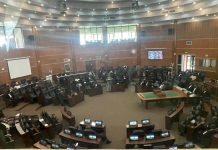Africa-Press – Lesotho. The office of the Chief Justice must be recognised as the head of the judiciary in line with international standards, while the Court of Appeal should be abolished, law experts have recommended.
This twin move would end incessant bickering in the top echelons of the judiciary as the current structure of the courts presents perennial problems that hobble delivery of justice to Basotho.
In its current form, the judiciary was failing dismally to meet the needs of Basotho because the current structure is anachronistic, dating back to the pre-independence era, experts note.
Experts have suggested major changes such as replacing the Court of Appeal with a Supreme Court of Appeal, the introduction of a permanent Constitutional Court as well as Basotho Courts to exclusively deal with traditional matters.
The experts also say the constitution must be reformed to clarify that it is the Chief Justice who is the head of the judiciary, not the President of the Court of Appeal and that the Chief Justice should sit in the Supreme Court of Appeal.
The country’s judicial crisis is linked to the fight for seniority between these two offices – the office of the Chief Justice and that of the President of the Appeal Court. As a result, there are tensions between the two offices.
The problems first surfaced between the late Justice Michael Ramolibedi (former President of the Appeal Court) who was at loggerheads with his colleague, Justice Mohapeloa Lehohla (former Chief Justice). The two were forced to resign and make way for suspended Chief Justice, Nthomeng Majara and the President of the Appeal Court, Dr Kananelo Mosito.
Recently, the Acting Chief justice (ACJ), ’Maeforo Mahase accused Justice Kananelo Mosito of undermining her as the head of the judiciary by issuing orders that interfere with the administrative functions of her office.
In the expert report on the justice sector reforms, experts say the clash between the two offices can be solved by the abolition of the Appeal Court so that the head of the judiciary becomes the Chief Justice who sits in the Supreme Court of Appeal.
Currently, the Court of Appeal is the apex court. The president of the Court of Appeal can review and set aside judgments from the High Court, including those of the chief justice.
The report was compiled by Advocate Motlatsi Ramafole, Advocate Elliot Makhera and E Edroma under the auspices of the Lesotho reform programme. It suggests there should be a “judge president” for the High Court who reports to the chief justice as the head of the judiciary.
The report has also made findings on the challenges facing the justice system in general which include, lack of confidence in the judicial systems because judges are appointed by politicians. Such lack of confidence in the system is also necessitated by the fact that the impeachment of judicial officers is arbitrary.
It further states: “The Judicial Service Commission (JSC) is skewed in favour of the Executive,” adding that the office of the ombudsman has been politicised and ineffective despite such an office having been introduced to enable an environment that allows for the proper administration of justice.
On top of that, the report states that the country’s constitution does not explicitly guarantee the independence of the judiciary hence many of the challenges facing it and as a result people lost confidence in the courts.
“The public perception and confidence in the courts of law is at its lowest.
” In the report, citizens also raised concerns that were endorsed by the experts. Circumstances under which bail is granted was said to be unclear and needs to be reviewed.
The report also states that Basotho in rural areas opt for central and local courts in order to resolve their disputes but while the said courts are an affordable and efficient way of resolving disputes, they often fail to follow due process or comply with human rights standards thus undermining the quality of justice.
Basotho continue to complain about the delay in the administration of justice that leads to backlog of cases, and subjection to long periods of imprisonment before prosecution and pretrial prisoners.
Other challenges facing the justice system, according to the report, include violation of human rights, police torture and brutality and that legal services are not available to marginalised and poor people.
The report said it is the inadequate provisions for judicial independence and other structural, systemic deficiencies in the justice system that have undermined the rule of law and denied Basotho equal access to justice with fair outcomes.
“Basotho’s culture of non-observance of human rights and fundamental freedom is exacerbated by the country’s fulfilment of international obligations, including the domestication of the international Human Rights treaties.
According to the experts, the constitution should be reformed to include provisions that set out principles that guarantee independence of the judiciary.
They also said appointments of the President of Court of Appeal and the Chief Justice should be depoliticised to allow the King to make the appointments.
This should be done after interviews have been conducted by the Judicial Service Commission (JSC) and submission of names to the Parliamentary Portfolio Committee on Justice, consultation of the Parliamentary Portfolio, committee on Justice with the Prime Minister then the Prime Minister advises the King on the appointment.
In the short and medium term, the report said there is need for introduction of periodic roving courts in the districts, per quarter pending decentralisation of the High Court and specialised courts, as well as the need for the sitting of the Court of Appeal throughout the year pending the abolition and replacement by the Supreme Court of Appeal.
Experts also stressed the need for the development of the justice sector policy for the efficient and effective administration of justice. The policy, they said, will provide for a legal environment that: Strengthens the rule of law and human rights, strengthens the internal and external accountability mechanisms to monitor excesses, curb corruption, maladministration and poor service delivery by the justice institutions.
“The police will also open the justice system to innovation by making greater use of technology to streamline processes and increase the resolution of cases and matters as well as implementing strategies for smarter justice financing to incentivize reform and ensure that they are sustainable,” reads the report in part.
For More News And Analysis About Lesotho Follow Africa-Press






